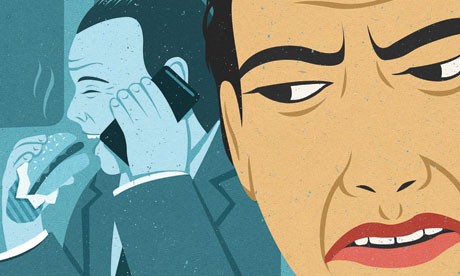
One of the great strengths of the English language is the number of ways it provides to describe people who annoy us. True, German has the word "Backpfeifengesicht" – "a face in need of a punch" – but English overwhelms us with options, thanks partly to its abundance of vulgarisms. If I call you a "wanker" I mean something subtly different from a "dickhead". (It can be hard to pinpoint these nuances without resort to further swearing, as demonstrated by users of urbandictionary.com, as they struggle to define a "prick": "An all around fucktard, dickweed, assrat bastard.") These differences aren't just a matter of intensity. We can presumably all agree that Simon Cowell is a bit of a tosser. But his success makes it hard to dismiss him as a fuckwit, while it's not clear he's guilty of the malice that would condemn him as a shit.
The American philosopher Aaron James makes an important contribution to this discussion in his new book Assholes: A Theory. (Let's stick with his spelling: an "arsehole", I think, is slightly more of a fool, and less of a villain, than an asshole.) Assholes, as James defines the term, present a conundrum: they enrage us out of all proportion to the damage they do. The asshole shouting into his phone on the bus, eating a smelly burger on the train or giving a running commentary at the cinema hardly ruins our lives. Yet there's something about them "bad enough to drive an otherwise coolheaded person into a fit of rage". That something, James concludes, is their failure to recognise the equal moral status of others. The asshole "allows himself to enjoy special advantage… out of an entrenched sense of entitlement", immunised against complaints. Obliviousness is a crucial ingredient here. We're outraged not by the phone-shouter's noise, but his refusal to grant that our interests count.
James offers a taxonomy of assholes, including the boorish asshole (Noel Gallagher), the reckless asshole (Dick Cheney) and the smug asshole (Richard Dawkins – who may be right about atheism, but who comes across as an asshole, James argues, because he seems to consider himself specially entitled to ignore the toughest philosophical arguments against his position). By no means all obnoxious behaviour is assholish: the queue-jumper who has no grasp of doing wrong may be a psychopath, while the queue-jumper who believes she has a special one-off justification for queue-jumping may just be selfish. Only the asshole queue-jumper thinks it's right that the rules against queue-jumping shouldn't apply to him.
The challenge, in dealing with assholes, is that it's hard to resist the temptation to fight on their terms: when you explode in rage at an asshole, James argues, you're really demanding that he recognise your moral status. But that defines you as a supplicant, and an inferior, seeking his approval, thus reinforcing the asshole's worldview – so don't be shocked if it doesn't work. A better, albeit harder, plan is to remind yourself that you're outraged less by the asshole's actions than by his inner motivations. A nasty smell on a train – or a few minutes' longer waiting in line – is a mild irritation, against which you may be justified in taking proportionate action. But the asshole's moral attitudes, in a deep sense, are none of your business. Getting too psychologically enmeshed in them just makes you a wazzock.
oliver.burkeman@theguardian.com
Follow Oliver Burkeman on Twitter

